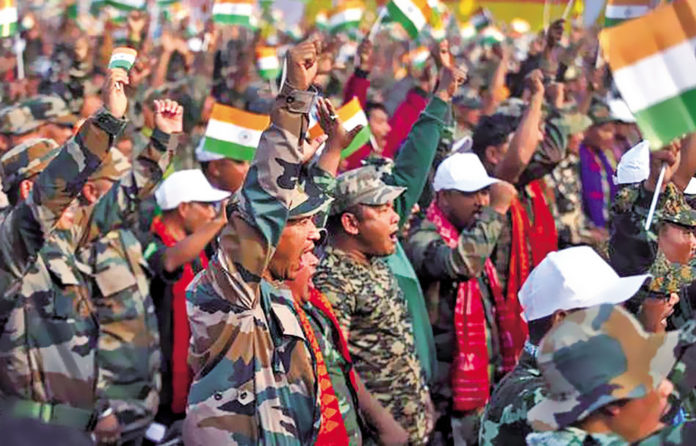On 27 January 2020, the Union government succeeded in bringing a closure to the militancy in the North east spanning over three decades. The deal was signed by all four insurgent factions of the National Democratic Front of Bodoland (NDFB), the All Bodo Students’ Union (ABSU), the United Bodo People’s Organisation (UBPO), a civil society body, besides the Central and Assam governments. Assam chief minister Sarbananda Sonowal, state finance minister and BJP’s Himanta Biswa Sarma and existing Bodo Council chief Hagrama Mahilary signed as witnesses.
This agreement can be called the Bodoland Territorial Region or BTR Accord as the existing Bodoland Territorial Areas District (BTAD) has been renamed as BTR. The BTR Accord is unique, wherein, it is the first peace agreement in the North-East where all the existing insurgent groups in a particular area have put their signatures, with a joint commitment to end violence and strive for progress and development. A key achievement by government negotiators has been their flexible approach in letting the area’s frontline student organisation, the ABSU, be a signatory to the deal.
There were speculations that the prime minister was likely to indicate that his government was looking to resolving other issues – such as the years-long armed conflict with Naga groups in the North-East or Gorkha demonstrators in northern Bengal – using a road map similar to the successful negotiations with all four factions of the banned National Democratic Front of Bodoland (NDFB).
Background
This was the third Bodo accord signed in the last 27 years when the violent movement for a separate Bodoland state claimed hundreds of lives, led to destruction of public and private property.
The first Bodo accord was signed with the All-Bodo Students Union (ABSU) in 1993, leading to the creation of Bodoland Autonomous Council with limited political powers.
In 2003, the second Bodo accord was signed with the militant group Bodo Liberation Tigers (BLT), leading to the formation of Bodoland Territorial Council (BTC) with four districts of Assam – Kokrajhar, Chirang, Baska and Udalguri – called the Bodoland Territorial Area District (BTAD).
The BTC has control over 30 subjects like education, forests, horticulture, but no jurisdiction on the police, revenue and general administration departments, which are controlled by the Assam government. The BTC was formed under the 6th Schedule of the Constitution.
Despite the 2003 agreement, the demand for a separate Bodo state outside Assam continued to be raised by several frontline Bodo groups, including the ruling Bodo People’s Front (BPF), an ally of the BJP in the state, as well as all rebel NDFB factions, besides the student group- ABSU. Government leaders assure that with the signing of the new Bodo pact, the demand for a separate Bodo state has been shelved.
The Accord
To arrive at the new Accord, negotiations were held with Bodo organisations for a comprehensive and final solution to their demands while keeping intact the territorial integrity of the State of Assam. NDFB chief Gobinda Basumatary, one of the signatories, observed that since most of the powers and aspirations of people seeking a separate state have been provided for in the new Accord, there is no need any more to demand a separate state.
Apart from more legislative, executive, administrative and financial powers, BTR is expected to see exchange of villages. A commission headed by a retired judge will work out a mechanism for inclusion of villages with a majority tribal population, contiguous to the present Bodo Council area, into BTR. Likewise, villages with a majority non-tribal population currently under the Bodo Council, but contiguous to non-Sixth Schedule areas (meaning areas outside the Council jurisdiction), will be excluded from the Council. This is expected to address the issues of both tribals, currently outside the Bodo Council as well as non-tribals, currently living within the Council.
Again, from 40 seats, the BTR Council will now have 60 seats. Up to 16 of these 60 seats could be open seats, meaning seats where non-tribals can also contest elections. Besides, there will be six nominated members in the BTR Council, including two women members and two from unrepresented communities. Therefore, for anyone to say that non-tribals have no reservations in the new BTR Accord it is incorrect.
Other significant provisions of the new accord are the decisions to set up a Bodo-Kachari Welfare Council for ‘focussed development’ of Bodo villages located outside the Bodo Council area, and declaring Bodo language in Devnagri script as an associate official language of Assam. Besides, measures for protection of the Bodo language and culture and setting up several institutions of higher and technical education have also been provided in the Accord.
Further, an economic programme of Rs1,500 crore will be implemented in the next three years. The Centre and the state will have equal contribution of Rs. 750 crore each. The deal has also made it mandatory for the Assam government to earmark an amount of Rs 250 crore per annum for a period of three years for development of areas under the BTR Council. The Centre will contribute an equal amount of Rs 250 crore per annum for the same period.
The funds will be used to set up industry, for employment package and to promote eco-tourism. Under the socio-cultural package, the government will set up a Central university in the name of Upendranath Brahma and a national sports university. The other projects include a regional medical institute, hotel management campus, a Mother Dairy plant, a National Institute of Technology and more Navodaya Vidyalayas.
Three days after signing a peace pact with the government, Assam’s chief minister Sarbananda Sonowal and other dignitaries attended the Arms and Ammunition Laying Down ceremony at GMCH auditorium, in Guwahati, on 30 January 2020. Over 1,600 cadres of the Bodo militant
group NDFB surrendered their arms and ammunition, which included over 4,800 weapons, including AK rifles, light-machine guns and stenguns
The chief minister said a comprehensive rehabilitation policy would be formulated for providing employment opportunities to the surrendered militants so that they could make meaningful contribution to the process of nation-building.
Comments
The Bodo settlement sketches out a road map on the government’s thinking and how it wants to proceed with militants groups of the North-East. It is a multipronged effort by security agencies and other arms of the government to engage with militant groups with the aim of bringing them to the negotiating table. On the whole, the new Bodo Accord has many firsts. For the first time a student organisation which had acted as a catalyst and unifier has become a signatory to an accord along with a civil society conglomeration. This presents itself as a new peace template for the region especially when government pushes its peace efforts in states like Manipur.
The government has been working on signing peace deals with insurgent groups such as Manipur’s United National Liberation (UNLF) Front – the oldest Meitei group agitating for a separate independent socialist state – and its armed outfit Manipur People’s Army. The UNLF, is active in Jiribam in Manipur and the Cachar district of Assam has an estimated cadre strength of 3,000.Also, they are engaging with outfits such as the Kanglei Yawol KannaLup (KYKL), another Meitei militant organization.
In Assam and Nagaland, efforts are also on to convince United Liberation Front of Assam (Independence), the last remaining ULFA faction, to join the talks. In Nagaland, with leaders such as Y Wangtin Naga breaking away from the Myanmar based NSCN (Khaplang) group and joining talks along with the NSCN (Reformation) the situation is much smoother. The government has decided not to engage with the Myanmar based NSCN (Khaplang) faction. However, on the contrary, strategic analysists suggest that bettering ties with Myanmar will be more productive approach of dealing with threats than otherwise intended.
Further, although the Accord was successful, the biggest challenge before all the stakeholders, including the government, would be to make it sustainable by enforcing commitments given in the new peace-accord. It is observed that the new Bodo accord has also created a political polarisation in the state. The All Bodo Students Union is expected to hold mega consultation with civil society groups to decide their future course of action after the Bodo Accord.
Analysts suggest that the Accord has altered the political dynamics in the Bodo heartland. If NDFB faction leaders now decide to join hands with an existing political party, United People’s Party Liberal (UPPL), that had backed these groups, or float a new political party and jump into the council elections scheduled in a few months’ time, the BPF is bound to face competition. Therefore, it is clear that unlike in the past, the Bodo Council, now renamed BTR, is set to witness a turf war or a political battle for supremacy among political parties or formations.
However, existing realities pose questions such as – will the Assam BJP’s key ally, the Mahilary-led BPF, give up so easily? It seems unlikely, because the BPF has been in power for the past 17 years in a row, not just with the BJP as an ally, but with the Congress before that. But with ABSU going all ballistic against the BPF and calling for a change in the political setup ruling Assam’s Bodo areas, the battle in the coming council polls is going to be tough. Besides, the fight in the 12 Bodo-dominated Assembly seats will also be interesting in the 2021 elections.
In all, North-East truly can enjoy fruits of peace and development if the Accord fulfils what it promises and become a bridge between India and Southeast Asia under New Delhi’s Act East policy. Although other insurgency movements too need a similar negotiated settlement. But what comes as an additional obstacle to North-East peace in recent months is the Citizenship (Amendment) Act (CAA) push, against which Assam is protesting and which has the potential to revive dying separatist movements. Thus, the central government needs to be cautious with its moves like CAA that could potentially light new fires in the North-East.


















